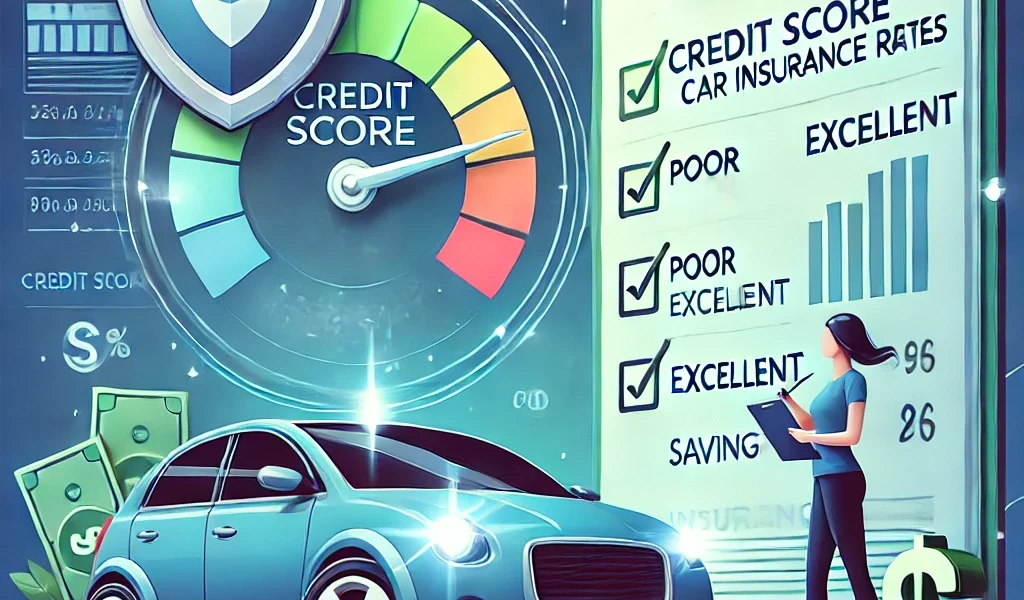Car insurance premiums can vary significantly from one driver to another. While factors like driving history, location, and vehicle type are well-known influences on insurance costs, many drivers are unaware that their credit score can also play a crucial role in determining their rates. Insurance companies often use credit-based insurance scores to assess the likelihood of a policyholder filing a claim. Understanding how your credit score affects your car insurance premium can help you take steps to improve it and reduce your costs.
In this comprehensive guide, we’ll explore the relationship between credit scores and car insurance rates, how insurers use credit-based scores, and actionable strategies to improve your credit and lower your insurance costs.
1. What is a Credit-Based Insurance Score?
A credit-based insurance score is a numerical rating derived from your credit history and financial behavior. Insurance companies use this score to assess risk and determine the likelihood of a policyholder filing a claim. While it is not the same as a standard credit score used for loans and credit cards, it is based on similar financial data.
Factors That Influence Your Credit-Based Insurance Score:
- Payment History – Timely payment of credit card bills, loans, and other debts.
- Credit Utilization – The percentage of available credit you are using.
- Length of Credit History – The duration of your credit accounts.
- Types of Credit – The mix of credit cards, loans, and other credit accounts.
- New Credit Inquiries – Recent applications for new credit lines.
2. How Does Your Credit Score Affect Car Insurance Rates?
Insurance providers believe that individuals with lower credit scores are statistically more likely to file claims. As a result, they may charge higher premiums to policyholders with poor or average credit scores. On the other hand, individuals with high credit scores are often rewarded with lower insurance premiums.
How Insurers Use Credit Scores:
- Risk Assessment – Insurers use credit-based insurance scores as part of their risk evaluation process.
- Premium Calculation – A higher credit score often results in lower premiums, while a lower score can lead to higher costs.
- Policy Approval – Some insurers may deny coverage to applicants with very poor credit.
Example Scenario:
Consider two drivers, Alex and Jordan, who have identical driving records and vehicles:
- Alex’s Credit Score: 780 (Excellent) – Receives an annual insurance premium of $900.
- Jordan’s Credit Score: 580 (Poor) – Receives an annual insurance premium of $1,500.
In this example, Jordan pays $600 more per year simply due to a lower credit score.
3. States That Restrict the Use of Credit Scores in Car Insurance
Not all states in the U.S. allow insurance companies to use credit scores when determining rates. States that have restrictions or bans on using credit-based insurance scores include:
- California
- Hawaii
- Massachusetts
- Michigan
- Washington
If you live in one of these states, your credit score should not directly impact your car insurance rates. However, in states where credit-based insurance scores are used, improving your credit score can significantly reduce your premium.
4. How to Improve Your Credit Score to Lower Your Insurance Premiums
Improving your credit score takes time, but with disciplined financial habits, you can achieve a better score and potentially lower your car insurance rates. Here’s how:
a) Pay Your Bills on Time
- Late payments negatively impact your credit score.
- Set up automatic payments or reminders to ensure bills are paid promptly.
b) Reduce Credit Card Balances
- High credit utilization can hurt your score.
- Aim to keep credit utilization below 30% of your total credit limit.
c) Avoid Opening Too Many New Accounts
- Applying for multiple credit cards or loans in a short period can lower your score.
- Only open new credit accounts when necessary.
d) Check Your Credit Report for Errors
- Obtain a free credit report from AnnualCreditReport.com.
- Dispute any errors that may be negatively impacting your score.
e) Build a Long Credit History
- The longer you maintain credit accounts in good standing, the better your score.
- Avoid closing old accounts unless necessary.
5. Other Ways to Lower Car Insurance Premiums
While improving your credit score is a long-term strategy, there are other immediate steps you can take to reduce your car insurance costs:
a) Shop Around for the Best Rates
- Different insurers weigh credit scores differently.
- Compare quotes from multiple providers to find the best deal.
b) Bundle Insurance Policies
- Many insurers offer discounts when you bundle auto and home insurance.
c) Increase Your Deductible
- Choosing a higher deductible lowers your premium.
- Ensure you have enough savings to cover the deductible in case of an accident.
d) Take Advantage of Discounts
- Look for good driver discounts, low-mileage discounts, and loyalty discounts.
e) Maintain a Clean Driving Record
- Safe driving habits help you qualify for lower premiums over time.
6. The Future of Credit Scores and Car Insurance
There is ongoing debate over whether credit scores should be used in car insurance pricing. Some consumer advocacy groups argue that credit scores do not accurately reflect a driver’s risk and disproportionately impact certain groups. However, insurers maintain that statistical data supports the correlation between credit scores and claim frequency.
As regulations continue to evolve, more states may place restrictions on the use of credit-based insurance scores. Keeping track of these changes and maintaining good financial habits will ensure you are always in the best position to secure affordable car insurance rates.
Conclusion
Your credit score can have a significant impact on your car insurance rates, especially in states where insurers are allowed to use credit-based insurance scores. By understanding how insurers assess risk and taking proactive steps to improve your credit score, you can potentially lower your premiums and save money in the long run.
If you are struggling with high insurance rates due to a poor credit score, start implementing the strategies outlined in this guide. Over time, better credit management can lead to lower car insurance costs, financial stability, and greater peace of mind.
Remember, a good credit score is not just beneficial for car insurance—it also impacts loan approvals, interest rates, and overall financial health. Take control of your credit today and enjoy the rewards of better insurance rates and financial freedom!



